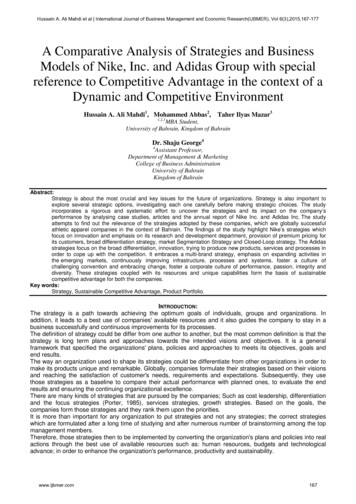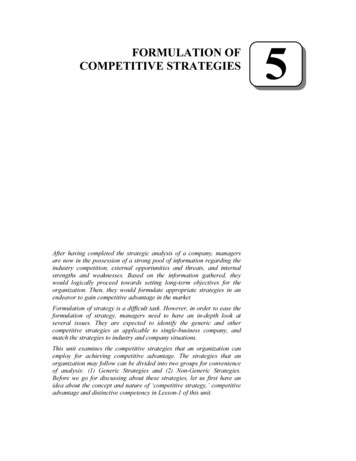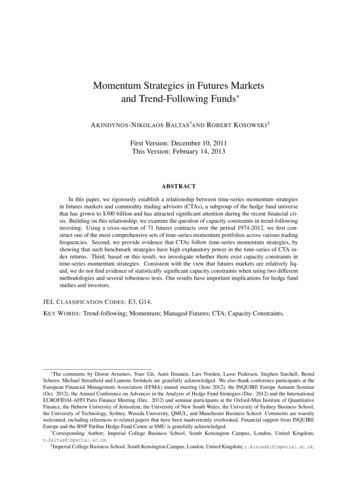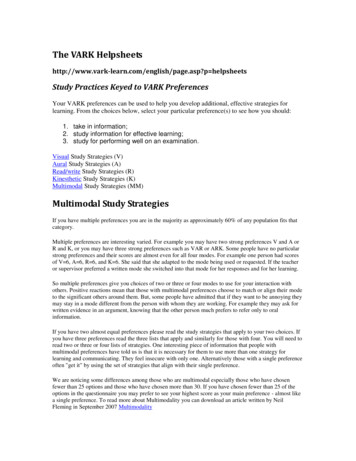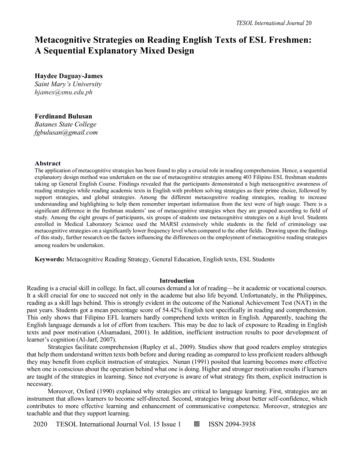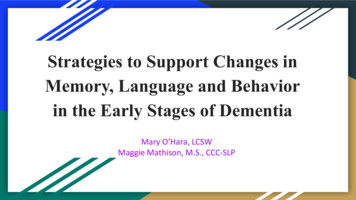
Transcription
Strategies to Support Changes inMemory, Language and Behaviorin the Early Stages of DementiaMary O’Hara, LCSWMaggie Mathison, M.S., CCC-SLP
BackgroundCosts of memory loss, language loss and changes in behavior on the person & familyLife of adaptation: communication, expectations, relationships, problem solving.Expectations: Not to reverse loss, but to compensate, cope with & minimize stressWith help, we can maximize a person’s abilities to remain independent, connected tothemselves and others.Until we have a cure, these types of interventions can make a difference in how youand your family live with and respond to dementia
Changes in Early Stage DementiaMemory, language, and behavior changes can occur in the early stages indifferent dementia diagnoses.Language - Word finding difficulties, having difficulty telling a cohesive storyor getting to the point.Memory - Taking in new information, forming new memories, followingthrough on tasksBehavior - Decision making, Paranoia, Personality, Executive Functions,Emotion, Mood, Awareness of Diagnosis/Changes
http://www.dfwsheridan.org/types-dementia
The Lobes of Brain
How can Speech Therapy help?Optimize retained abilities to teach the use of memory aids and compensatorymemory strategies that will improve the patient’s cognitive/communicativefunction as well as establish patterns that will be helpful in the future.Provide patient and family education on the impacts on cognition and language,and what can be done to maintain the person’s function and well beingSpeech therapy is indicated on an ongoing basis as needed as the diseaseprogresses to develop and modify communication strategies and aids
How can Occupational Therapy (OT) help?Enable client to function at their highest level of independence in a meaningfulway.Focuses on how the environment impacts someone’s ability to perform tasks.Simplify tasks to help the client become more successfulThe OT ensures success in all activities by setting them up at the proper level ofcognitive functioning.Journal of Alzheimer’s Disease found that OT can lower the burden on caregiversand reduce the amount of care a person needs.
Impacts of Communication Impairments Word finding difficultiesDifficulty telling a cohesivestoryTrouble understandinglengthy and complexinformation may lead to.Avoiding social situationsProblem behaviorsIncreased stress on thecare partnersCompromised safety andwell beingLoss of independence
Care Partner Training Training the care partner in effective communication strategies andaids: Improves communication effectiveness Increases knowledge about communication and dementia Improves attitudes about adults with dementia Increases satisfaction of communication Decreases problem behaviors
Communication Strategies Eliminate distractions (turn off TV or radio, limit number of people inconversation) Establish and maintain eye contact Use short, simple sentences Speak slowly Ask one question or give one instruction at a time Use “yes/no” questions instead of “who, what, when, where, why” questions
Communication Strategies, con’t If the person does not respond or the response doesn't make sense, repeat once using thesame wording If the person still does not respond or the response doesn't make sense, rephrase themessage Avoid interrupting the person and allow plenty of time for him/her to respond Encourage the person to “talk around” or describe or gesture the meaning of the word he/sheis searching for Use materials such as books, pictures, magazines, and games, during communicationinteractions Verify that you’ve understood what the person told you to ensure you got the message right
Memory Impairments Remembering to do things in the futureRecalling recent conversations and eventsTrouble learning new skills
Training compensatory strategies Systematically training the use of strategies to cope with memorydifficulties Planners Calendars Memory books Taking photos Environmental signsAlso helps with communication!
Changes in Behavior ApathyDisinhibition and Impulsivity, Utilization behaviorsCompulsive/ Obsessive BehaviorsInappropriate social behaviorLack of empathy (interest in, or understanding of, what others feel)Changes in food preferencesInappropriate sexual behaviorsAgitationParanoiaHallucinations and Delusions
Behaviors: A Few TipsRemember that this is due to the disease process. Find tools to help you let things go and not take them personallyForewarn family/friends of the person’s behaviors to prepare them with what to expect and how to best respond.Consider if the behavior is really a problem; Does it cause any safety risks/costs? What’s the worst case scenario if it continues? What if youlearned to accommodate it?If you cannot stop a behavior, how can you minimize the impact?Remove or hide objects in the environment or avoid places that might trigger the behavior.Don’t Argue or reason if the person insists on a different reality. Use a calm, matter-of-fact tone of voice. Try not to sound condescending.Try to distract the person with something appealing to them like a snack, music, a phone call, or other favorite activity.Consider how mood is impacting the person and address with care teamCall 911 if you think you or others are in imminent danger.
D.I.C.E.D: Describe what happens: What does the person do? How does the person feel about it? Is the person’s safety atrisk? Where did the behavior occur? What happened before and after the behavior? Who was there?I:Investigate the Causes: In Pain? Unmet Need? Fear? Overstimulated? Bored? Disoriented? Activity notmatch ability?C: Create a Plan: Simplify environment, Adapt communication, increase structure/activity, Introduce types ofdistractions, Who else can be involved? Respond to unmet needs, Speak with MDE:Evaluate the Plan: What worked? What didn’t? Why not? Any unintended side effects?Adapted from: Fraker, J., Kales, H. C., Blazek, M., Kavanagh, J., & Gitlin, L. N. (2014). The Role of the OccupationalTherapist in the Management of Neuropsychiatric Symptoms of Dementia in Clinical Settings. Occupational Therapy inHealth Care, 28(1), 4–20. doi:10.3109/07380577.2013.867468
APATHYEXAMPLES: Flat affect; No interest in activities; Loss of initiative, empathy, compassion; Loss of interest inhygiene, appearance, bathing Use Multi-Sensory Stimulation - Touch, Smell, Sound Use Music- Create a playlist of songs they once enjoyed Use Reward Based motivation Plan outings ideally around best time of day Use Cuing based upon Cognitive Needs Occupational Therapy Services (need referral for insurance) Consider Who else can be involved? Consider Companions with staff experienced in apathy
DISINHIBITION & IMPULSIVITYEXAMPLES: Theft or shop lifting, No Social Filter, Sharing Personal information, Sexually inappropriate, Unable tocontrol impulses, untilization behaviors (touching/picking up items for no purpose) Tell People about the diagnosis or share “I have/This person has Dementia” cards Determine places that you must avoid Distract with subject/someone of interest: call person on the phone, Offer a candy/gumSecure/Remove weapons from home.Limit Internet Access, monitor bank accounts, investmentsAllow sexual needs to be met privately and safelyRemain Calm- Do not overreact
AGGRESSIVE BEHAVIOREXAMPLES: Shouting, Name calling, Lewd or offensive comments, Hitting, Grabbing Hand out “This Person has Dementia” Cards Reduce overstimulation and noiseDetermine triggers of aggression and try to avoidAvoid Confrontation Don’t Touch without permissionUse Calm Voice, Give Space and validate feelings Secure or Remove weapons from homeManage Internet, Social MediaCall 911 if you feel you, they, or others are in danger
COMPULSIVE/RITUALISTIC BEHAVIORSEXAMPLES: Perseverating, Telling the same story, Rummaging, Unusual Voices, Humming, Picking, Roaming,Religious Obsessions, Difficulty with a change in plans, Shopping for same item, hoarding Can it continue if it’s safe and doesn’t cost money?Encourage safe repetitive activities (sorting, raking, sweeping, folding, puzzles, supervisedwalking)Consult with an Occupational Therapist to Modify Environment to ensure safetyIs there a Tactile Object to Occupy – Ex:Squeeze ballUse signs saying “Stop” or “Turn Around”Manage Internet accessFind respite away from the behaviorUse a ritual or obsession/interest to motivate them
PSYCHIATRIC CONSULTATION NEEDED? If there are mood symptoms such as anxiety, depression, irritability, poorfrustration tolerance or anger.If there are changes in behavior which are highly disruptive or dangerousMedications: Atypical antipsychotics have been used to treat agitation, but theycan also bring increased risk from unwanted side effects and are not approvedfor use in Frontotempotal Degeneration (FTD).* *Source: The AFTD
Take AwaysDo not assume that cognitive/behavior/personality changes are always due to dementia. Sudden changescould be a sign of an infection, pain, or side effect of a medication.Don’t assume nothing will work - You may be surprised.Two heads are better than one: Family members need support and respite to creatively problem solveConsider the time of day and level of stimulation when implementing changes/working on strategies.Until we have a cure, these types of interventions can make a difference in how you and your family livewith and respond to dementia.
We Cannot change the disease but .We can change how we respond to it.We can change how we think about it.We can take time each day to focus on what remains, strengths, positivemoments of connection or even laughterWith help, we can maximize a person’s abilities to help them remainindependent, connected to themselves and others, and hopeful.
Resources: Who Can Help?Request a referral for a Speech Therapist (SLP) who understands dementia for memory and language strategies. Don’tassume that you’ll be referred.Request a referral for an Occupational Therapist (OT) who understands dementia for strategies to maintainindependence. Don’t assume that you’ll be referredRequest a referral to a counselor/social service provider who understands behavioral changes due to dementia to helpwith strategies and coping. Don’t assume that you’ll be referred.Attend a support group to hear the experiences of others.Alzheimer’s Association: www.alz.orgNational Aphasia Association- https://www.aphasia.org/Association for Frontotempotal Degeneration: www.theaftd.org
ReferencesAlzheimer’s Association Facts and Figures: resDementia Friendly Wyoming: http://www.dfwsheridan.org/types-dementiaFraker, J., Kales, H. C., Blazek, M., Kavanagh, J., & Gitlin, L. N. (2014). The Role of the Occupational Therapist in the Management ofNeuropsychiatric Symptoms of Dementia in Clinical Settings. Occupational Therapy in Health Care, 28(1), 4–20.doi:10.3109/07380577.2013.867468Discussion by Hall, Geri R. PhD; Bird, Thomas D. MD; Nichols, K. Frontotemporal Dementia: Issues of Sexuality. November 23, 2009.Pimouguet C, Le Goff M, Wittwer J, Dartigues JF, Helmer C. Benefits of Occupational Therapy in Dementia Patients: Findings from aReal-World Observational Study. J Alzheimers Dis. 2016 Dec 9, doi: 10.3233/JAD-160820.The Association for Frontotemporal Degeneration www.aftd.orgUniversity of San Francisco Memory and Aging -changes#Impulsive-or-Disinhibited-Behavior
Memory, language, and behavior changes can occur in the early stages in different dementia diagnoses. Language - Word finding difficulties, having difficulty telling a cohesive story or getting to the point. Memory - T
